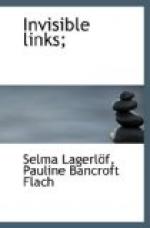It was so with him now. The girl whom he had seen among the rushes came back in his dreams. He met her out in the open pool, where the sunlight fell even greener than among the rushes, and he had time to see that she was beautiful. He dreamed that he had crept up on the big pine root in the middle of the dark tarn, but the pine swayed and rocked so that sometimes he was quite under water. Then she came forward on the little islands. She stood under the red mountain ashes and laughed at him. In the last dream-vision he had come so far that she kissed him. It was already morning, and he heard that Berg Rese had got up, but he obstinately shut his eyes to be able to go on with his dream. When he awoke, he was as though dizzy and stunned by what had happened to him in the night. He thought much more now of the girl than he had done the day before.
Towards night he happened to ask Berg Rese if he knew her name.
Berg looked at him inquiringly. “Perhaps it is best for you to hear it,” he said. “She is Unn. We are cousins.”
Tord then knew that it was for that pale girl’s sake Berg Rese wandered an outlaw in forest and mountain. Tord tried to remember what he knew of her. Unn was the daughter of a rich peasant. Her mother was dead, so that she managed her father’s house. This she liked, for she was fond of her own way and she had no wish to be married.
Unn and Berg Rese were the children of brothers, and it had long been said that Berg preferred to sit with Unn and her maids and jest with them than to work on his own lands. When the great Christmas feast was celebrated at his house, his wife had invited a monk from Draksmark, for she wanted him to remonstrate with Berg, because he was forgetting her for another woman. This monk was hateful to Berg and to many on account of his appearance. He was very fat and quite white. The ring of hair about his bald head, the eyebrows above his watery eyes, his face, his hands and his whole cloak, everything was white. Many found it hard to endure his looks.
At the banquet table, in the hearing of all the guests, this monk now said, for he was fearless and thought that his words would have more effect if they were heard by many, “People are in the habit of saying that the cuckoo is the worst of birds because he does not rear his young in his own nest, but here sits a man who does not provide for his home and his children, but seeks his pleasure with a strange woman. Him will I call the worst of men.”—Unn then rose up. “That, Berg, is said to you and me,” she said. “Never have I been so insulted, and my father is not here either.” She had wished to go, but Berg sprang after her. “Do not move!” she said. “I will never see you again.” He caught up with her in the hall and asked her what he should do to make her stay. She had answered with flashing eyes that he must know that best himself. Then Berg went in and killed the monk.




